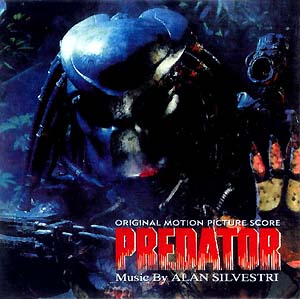
Predator: Original Motion Picture Soundtrack is the official soundtrack album of the 1987 action film Predator. It was composed by Alan Silvestri. The score is completely orchestral and was released in 2003.
John Paesano is an American composer working primarily in film, television, and video games. He is known for collaborating with director Wes Ball on the Maze Runner film trilogy and Kingdom of the Planet of the Apes, as well as composing for the Marvel Television series Daredevil and The Defenders. As a video game composer, he has contributed music to the acclaimed titles Detroit: Become Human and the three installments in the Marvel's Spider-Man series. Paesano won the BAFTA Games Award for Music, as well as the D.I.C.E. Award for Outstanding Achievement in Original Music Composition.

Rio 2 (Music from the Motion Picture) is the soundtrack album to the film of the same name, the sequel to the 2011 film Rio, directed by Carlos Saldanha. Featuring contributions from Brazilian and American artists, the album is produced by the film's composer John Powell and Brazilian musician Sérgio Mendes. Like the first film, the soundtrack for the sequel also incorporates Brazilian music, while infusing pop, latin and hip hop genres into the album. It is preceded by the single "What is Love" performed by Janelle Monáe, that was released on March 4, 2014 and the album was released by Atlantic Records and Fox Music, on March 25. Rio 2 (Original Motion Picture Score) consisting the film's score by Powell, was released on April 15, 2014.
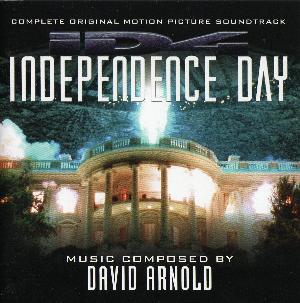
The soundtrack to the 1996 science fiction action film Independence Day features musical score composed by David Arnold. It was first issued by RCA Victor in conjunction with the film's release consisted over fourteen tracks. An expanded score was released by La-La Land Records on April 2010, in a limited edition two-disc set that contains the film's score in its entirety in addition to 12 alternate cues. The score was acclaimed by critics and won the Grammy Award for Best Instrumental Composition Written for Motion Picture or Television.

Oz the Great and Powerful (Original Motion Picture Soundtrack) is the soundtrack album to the 2013 film of the same name, produced by Walt Disney Pictures. The film is directed by Sam Raimi, and featured musical score composed by Danny Elfman. The score was recorded at Sony Scoring Stage and the album featured 27 tracks with a promotional single titled "Almost Home" performed by American singer-songwriter Mariah Carey. The soundtrack was released by Walt Disney Records on March 5, 2013, followed by a physical CD release in association with Intrada Records on March 26.
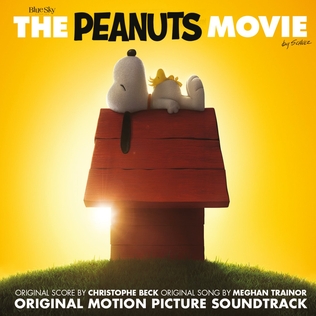
The Peanuts Movie (Original Motion Picture Soundtrack) is the soundtrack album to the 2015 animated film The Peanuts Movie, directed by Steve Martino and produced by Blue Sky Studios. Based on Charles M. Schulz's comic strip Peanuts, it is the fifth full-length Peanuts film, and the first in 35 years. The original score is composed by Christophe Beck, with contributions from jazz pianist David Benoit and Meghan Trainor, who performed an original song titled "Better When I'm Dancin', released as a single on October 14, 2015. The soundtrack was digitally released by Epic Records and Fox Music on October 23, 2015.
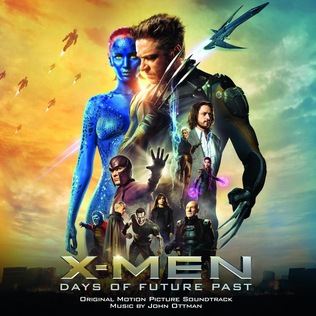
X-Men: Days of Future Past is the soundtrack album to the 2014 film X-Men: Days of Future Past, based on the X-Men characters appearing in Marvel Comics, and is the fifth mainline installment in the X-Men film series and the seventh installment overall. Directed and produced by Bryan Singer, the film score is composed by his regular collaborator, composer-editor John Ottman, being the first to score more than one film in the X-Men film series, having previously scored X2 (2003).
The Iron Giant is the 1999 animated science fiction film directed by Brad Bird for Warner Bros. Feature Animation. The film featured original score composed by Michael Kamen, in his first and only collaboration with Bird, as all his future films were scored by Michael Giacchino beginning with The Incredibles (2004). The score featured additional performance from the Czech Philharmonic symphony orchestra at Prague, conducted by Kamen himself and recording of the score happened within one week.

Rise of the Planet of the Apes (Original Motion Picture Soundtrack) is the score album to the 2011 film Rise of the Planet of the Apes, a reboot of the Planet of the Apes film franchise. The film's original score was composed by Patrick Doyle, and was released by Varèse Sarabande on August 9, 2011.
The 2011 animated musical adventure comedy film of the same name, produced by Blue Sky Studios and 20th Century Fox Animation, and directed by Carlos Saldanha, featured two albums released for the film: an original soundtrack and an original score. Interscope Records released the film's soundtrack Rio (Music from the Motion Picture) on April 5, 2011 in digital formats, and a physical release on April 12. The album produced by the film's composer John Powell, and Brazilian musician Sérgio Mendes, featured collaborations from Brazilian and American artists, along with songs performed by the film's cast members. The music received critical acclaim from critics, praising the Brazilian influences in the music and creative choices of involving the native musicians to influence South American culture. Powell's score was a separate album, titled Rio (Original Motion Picture Score), which was released by Varèse Sarabande on April 19, 2011.

Ferdinand (Music from the Motion Picture) is the soundtrack extended play that accompanied the 2017 film of the same name, released by Island Records on December 1, 2017. The album featured three original songs, with two of them being released as singles: "Home" and "Watch Me" performed by Nick Jonas. The score album, composed by John Powell, was released as Ferdinand (Original Motion Picture Score) by Fox Music on December 15, 2017.
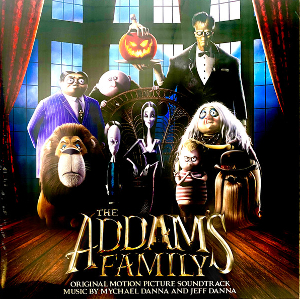
The Addams Family (Original Motion Picture Soundtrack) is the score album to the 2019 film of the same name directed by Conrad Vernon and Greg Tiernan based on the characters created by Charles Addams. The film's original music is composed by Mychael Danna and Jeff Danna, released by Lakeshore Records on October 11, 2019 alongside the film. The film also featured two songs: "My Family" recorded by Migos, Karol G, Snoop Dogg, and Rock Mafia, and "Haunted Heart" by Christina Aguilera released as singles on September 13 and 27, but not in the film's soundtrack. On January 24, 2020, the soundtrack was published in double vinyl by Enjoy The Ride Records and Mondo.
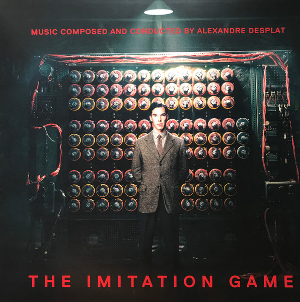
The Imitation Game (Original Motion Picture Soundtrack) is the score album to the 2014 film of the same name. The film is scored by Alexandre Desplat who replaced the original composer Clint Mansell before the film's production commenced. The London Symphony Orchestra performed the original score that featured various instruments such as keyboards, clarinets, strings, arpeggio and bombe. The album was released on November 7, 2014 by Sony Music Entertainment. The album received critical acclaim and was nominated for several awards, including the Academy Award for Best Original Score but lost to The Grand Budapest Hotel, also composed by Desplat.

Pete's Dragon (Original Motion Picture Soundtrack) is the soundtrack to the 2016 film of the same name directed by David Lowery. The album featured three original songs written for the film, as well as four existing tracks, and recorded by Bonnie "Prince" Billy, St. Vincent, Leonard Cohen, Bosque Brown, The Lumineers, Lindsey Stirling, Andrew McMahon in the Wilderness and Okkervil River. It also featured a new rendition of "Candle on the Water", the only song that was used from the 1977 original film, and also consisted 20 tracks from the original score composed by Daniel Hart. The album was released by Walt Disney Records on August 12, 2016.
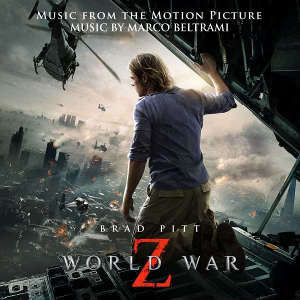
World War Z: Music from the Motion Picture is the score album to the 2013 film of the same name directed by Marc Forster. Featuring original score composed by Marco Beltrami, the album featuring 11-tracks were released by Warner Bros. Records on June 18, 2013.
The music to the 2011 science fiction sports drama film Real Steel directed by Shawn Levy, featured a compilation of songs by popular artists as heard in the film and an album that contains the original score written and composed by Danny Elfman. The first album, Real Steel – Music from the Motion Picture, was released on October 4, 2011 by Interscope Records. It consists of 13 tracks featuring artists including Foo Fighters, Tom Morello, Eminem, Royce da 5'9", The Crystal Method, Yelawolf, 50 Cent and Limp Bizkit. Elfman's score that featured over 17 tracks, was released into a separate album as Real Steel – Original Score on November 8, 2011 by Varèse Sarabande.
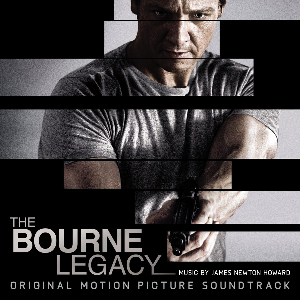
The Bourne Legacy: Original Motion Picture Soundtrack is the soundtrack to the 2012 film The Bourne Legacy, which is the fourth installment in the series of films adapted from the Jason Bourne novels by Robert Ludlum and Eric Van Lustbader. The musical score is composed by James Newton Howard, becoming the first film in the series not to be composed by John Powell, who provided music for previous Bourne installments, due to his interest in scoring animated films. The album was digitally released through Back Lot Music on August 7, 2012, and a physical release by Varèse Sarabande on August 21, 2012. The album featured a new version of Moby's "Extreme Ways" subtitled with "Bourne's Legacy" released as a single on July 31. The music received mixed critical response.
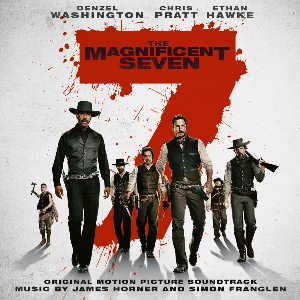
The Magnificent Seven (Original Motion Picture Soundtrack) is the soundtrack to the 2016 film The Magnificent Seven, which is a remake of the 1960 film of the same name. Directed by Antoine Fuqua, the film stars Denzel Washington, Chris Pratt and Ethan Hawke. The film features an original score composed by late James Horner and Simon Franglen. The score was released through Sony Classical Records on September 16, 2016, becoming Horner's fourth score to be released posthumously.

The Karate Kid (Music from the Motion Picture) is the soundtrack to the 2010 film The Karate Kid, directed by Harald Zwart and starred Jaden Smith and Jackie Chan, which is a remake of the 1984 film of the same name and the fifth film in The Karate Kid franchise. The album featured 18 tracks composed by James Horner and released through Madison Gate Records on June 15, 2010.

Now You See Me (Original Motion Picture Soundtrack) is the soundtrack to the 2013 film Now You See Me directed by Louis Leterrier. The film's original score is composed by Brian Tyler and features songs performed by the Two Door Cinema Club, Phoenix, Zedd and Galactic. The soundtrack was released digitally and physically on May 28, 2013 through Glassnote Records.
















